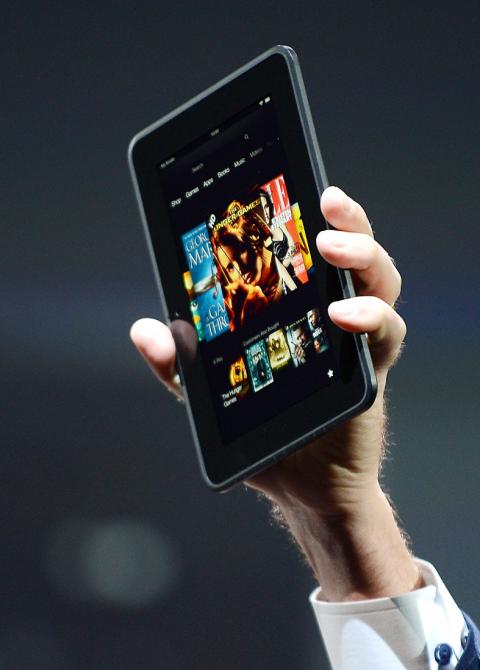Online retail titan Amazon announced on Thursday it is expanding sales of its Kindle tablets to “over 170 countries and territories around the world,” and its Appstore in nearly 200 countries.
The move steps up the offensive of Amazon against rivals like Apple and Google in the market for tablets and content sold for the devices.
“Kindle Fire HD is the No. 1 best-selling item in the world for Amazon since its launch, and we’re thrilled to make it available to even more customers around the globe today,” Amazon Kindle vice president Dave Limp said.

Photo: AFP
“Not only does Kindle Fire feature advanced hardware, it’s also a service. When combined with our content ecosystem, great e-mail and browsing and top-rated customer service, we hope people around the world will agree that Kindle Fire HD is the best tablet for an incredible price,” he said.
Amazon said the Kindle Fire, which start in the US market at US$159, will start shipping to the additional countries by June 13. Up to now it had been sold outside the US only in Britain, Germany, France, Italy, Spain and Japan.
The company said its Amazon Appstore “is now available to millions of customers in nearly 200 countries,” offering games, books and other content.
Amazon sells apps for Kindle, but also for PCs and other Android phones and devices.
The Appstore was launched in 2011 and prior to Thursday was only available in Britain, Germany, France, Italy, Spain, China, Japan and the US.
Amazon is competing with the likes of Apple and Google in the market for tablets and also online content and apps.
The Seattle-based company has not released sales figures, but research firm International Data Corp said Amazon is the fourth-leading seller of tablets despite limited distribution, with 1.8 million units sold in the first quarter.
Amazon is likely using the Kindle to globally expand its power as an online retailer, Silicon Valley analyst Rob Enderle said.
“They are selling digital storefronts,” Enderle said of putting Kindle tablets into the hands of people around the world.
“The Kindle is a window into Amazon,” he said. “It is about much more than e-books, music and movies; once you are, there Amazon wants to sell you televisions, refrigerators, stereos and more.”
Even when sold at a loss, Kindle tablets power a profitable “ecosystem” for Amazon with sales of digital media boasting attractive margins, Morgan Stanley said in a note to investors.
“Amazon could lose money on every Kindle they sold and it would still be a great deal for Amazon,” Enderle said.
A challenge for Amazon will be getting retailers around the world to embrace peddling Kindle tablets that will compete for customers’ cash once in their hands, he said.
“Amazon still has to sell Kindles in places where they are not big,” Enderle said. “If I am a retailer in South America, do I really want to sell someone a doorway into Amazon?”

Real estate agent and property developer JSL Construction & Development Co (愛山林) led the average compensation rankings among companies listed on the Taiwan Stock Exchange (TWSE) last year, while contract chipmaker Taiwan Semiconductor Manufacturing Co (TSMC, 台積電) finished 14th. JSL Construction paid its employees total average compensation of NT$4.78 million (US$159,701), down 13.5 percent from a year earlier, but still ahead of the most profitable listed tech giants, including TSMC, TWSE data showed. Last year, the average compensation (which includes salary, overtime, bonuses and allowances) paid by TSMC rose 21.6 percent to reach about NT$3.33 million, lifting its ranking by 10 notches

SEASONAL WEAKNESS: The combined revenue of the top 10 foundries fell 5.4%, but rush orders and China’s subsidies partially offset slowing demand Taiwan Semiconductor Manufacturing Co (TSMC, 台積電) further solidified its dominance in the global wafer foundry business in the first quarter of this year, remaining far ahead of its closest rival, Samsung Electronics Co, TrendForce Corp (集邦科技) said yesterday. TSMC posted US$25.52 billion in sales in the January-to-March period, down 5 percent from the previous quarter, but its market share rose from 67.1 percent the previous quarter to 67.6 percent, TrendForce said in a report. While smartphone-related wafer shipments declined in the first quarter due to seasonal factors, solid demand for artificial intelligence (AI) and high-performance computing (HPC) devices and urgent TV-related orders

Prices of gasoline and diesel products at domestic fuel stations are this week to rise NT$0.2 and NT$0.3 per liter respectively, after international crude oil prices increased last week, CPC Corp, Taiwan (台灣中油) and Formosa Petrochemical Corp (台塑石化) said yesterday. International crude oil prices last week snapped a two-week losing streak as the geopolitical situation between Russia and Ukraine turned increasingly tense, CPC said in a statement. News that some oil production facilities in Alberta, Canada, were shut down due to wildfires and that US-Iran nuclear talks made no progress also helped push oil prices to a significant weekly gain, Formosa said

MINERAL DIPLOMACY: The Chinese commerce ministry said it approved applications for the export of rare earths in a move that could help ease US-China trade tensions Chinese Vice Premier He Lifeng (何立峰) is today to meet a US delegation for talks in the UK, Beijing announced on Saturday amid a fragile truce in the trade dispute between the two powers. He is to visit the UK from yesterday to Friday at the invitation of the British government, the Chinese Ministry of Foreign Affairs said in a statement. He and US representatives are to cochair the first meeting of the US-China economic and trade consultation mechanism, it said. US President Donald Trump on Friday announced that a new round of trade talks with China would start in London beginning today,